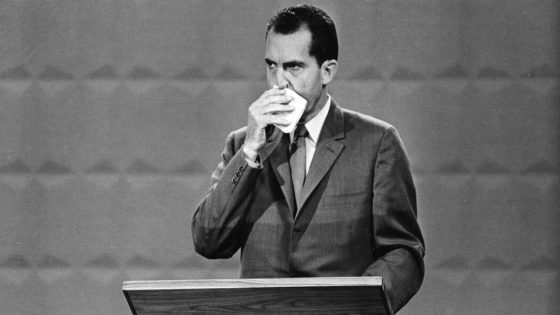When President Biden and former President Donald J. Trump take the debate stage on Thursday, each will be on guard against a gaffe or looking to deliver a one-liner that could dominate the news.
Such presidential debate moments — missteps, one-liners, flops and various “Oops” moments — can even land in the history books.
In the first televised presidential debate, in 1960, a confident Senator John F. Kennedy dominated Vice President Richard Nixon, who appeared sweaty and disheveled as he recovered from an illness. In 1992, President George H.W. Bush impatiently checked his watch in full view of the cameras. President Ronald Reagan — in a move relevant to both candidates this cycle — used a joke to deflate concerns about his age in 1984.
Here is a look back at debate moments that helped define presidential campaigns.
“There you go again”: Reagan vs. Carter in 1980
Gov. Ronald Reagan of California, a Republican, faced President Jimmy Carter, a Democrat, in the last debate of 1980, one week before Election Day.
Mr. Carter went on the offensive in a lengthy speech attacking Mr. Reagan’s opposition to Medicare.Mr. Reagan responded with the now-famous line: “There you go again.” The charismatic retort instantly defused Mr. Carter’s protracted attack. Reporters characterized Mr. Carter’s speech as hyperbolic, even though the criticisms were based on Mr. Reagan’s record as governor.
Mr. Reagan made that line a frequent rejoinder, deploying it in news conferences and in a 1984 presidential debate against former Vice President Walter Mondale.
Coldness and an insult: Dukakis vs. Bush Sr., and their running mates, in 1988
Voters in 1988 bore witness to two memorable debate moments. During the debate between Gov. Michael Dukakis of Massachusetts, a Democrat, and George H.W. Bush, a Republican who was then the vice president, the moderator, Bernard Shaw, asked the governor if he would support the death penalty if his wife, Kitty Dukakis, were raped and murdered.
Commentators later called the question unfairly personal. But Mr. Dukakis responded with a stoic “no,” followed by a discourse on the statistical ineffectiveness of capital punishment. Observers said his inability to muster a less analytical answer cemented the perception that he was overly intellectual.
In the vice-presidential debate eight days earlier, Senator Lloyd Bentsen, Mr. Dukakis’s running mate, told off Senator Dan Quayle for having invoked Mr. Kennedy in defense of his own qualifications.
“Senator, I served with Jack Kennedy. I knew Jack Kennedy. Jack Kennedy was a friend of mine,” Mr. Bentsen said, declaring — to gasps and then applause — “Senator, you’re no Jack Kennedy.”
“That was really uncalled-for, senator,” Mr. Quayle responded.
Mr. Quayle was seen as both meek and petulant by late-night hosts and reporters for his stunned response. “Saturday Night Live” went so far as to portray him as a child.
Gore gets in his face: Gore vs. Bush Jr. in 2000
During a town-hall-style debate between Gov. George W. Bush, Republican of Texas, and Vice President Al Gore, a Democrat, Mr. Gore stood up from his chair to strike a confrontational pose. It backfired immediately.
While Mr. Bush was answering a question, Mr. Gore drew close to Mr. Bush and stood next to him silently. Mr. Bush, confused, looked him down and gave him a dismissive nod. The audience laughed, and Bush continued. Mr. Gore, rather than looking tough, came off as unnecessarily standoffish.
A stalking vibe: Trump vs. Clinton in 2016
Donald J. Trump changed the landscape of debate etiquette in 2016, ratcheting up the use of ad hominem attacks and made-for-TV one-liners. But it was perhaps his body language during a debate with former Secretary of State Hillary Clinton that generated the most attention.
At one point, Mrs. Clinton, the Democratic nominee, addressed the audience, turning away from Mr. Trump, her Republican opponent. Mr. Trump walked closely behind her, giving a pained or scornful look to the camera or to Mrs. Clinton.
Many observers said it looked as though Mr. Trump were a predator looming over his prey. The point was accentuated by their respective height difference. Mrs. Clinton, the first female presidential nominee of a major party, stood at about 5-foot-4, while Mr. Trump, at 6-foot-3, towered over her.
In her memoir written after her loss, Mrs. Clinton said she should have been more aggressive during the debates.
The debate of interruptions: Biden vs. Trump in 2020
The first time that Mr. Biden and Mr. Trump debated was one big back-and-forth, with the moderator barely getting a word in edgewise.
With no rule to cut off candidates’ microphones — a measure that CNN will employ during Thursday’s debate — Mr. Biden and Mr. Trump constantly talked over each other.
As Mr. Biden tried to respond to a question about abolishing the filibuster and increasing the number of Supreme Court justices, he was repeatedly heckled by Mr. Trump. Mr. Biden, exasperated, finally told the president: “Will you shut up, man?”
The moderator, Chris Wallace, threw up his hands and declared that the line of discussion had ended. Commentators widely viewed the debate as among the least professional — and for curious voters, the least informative — in recent history.
Source Agencies




